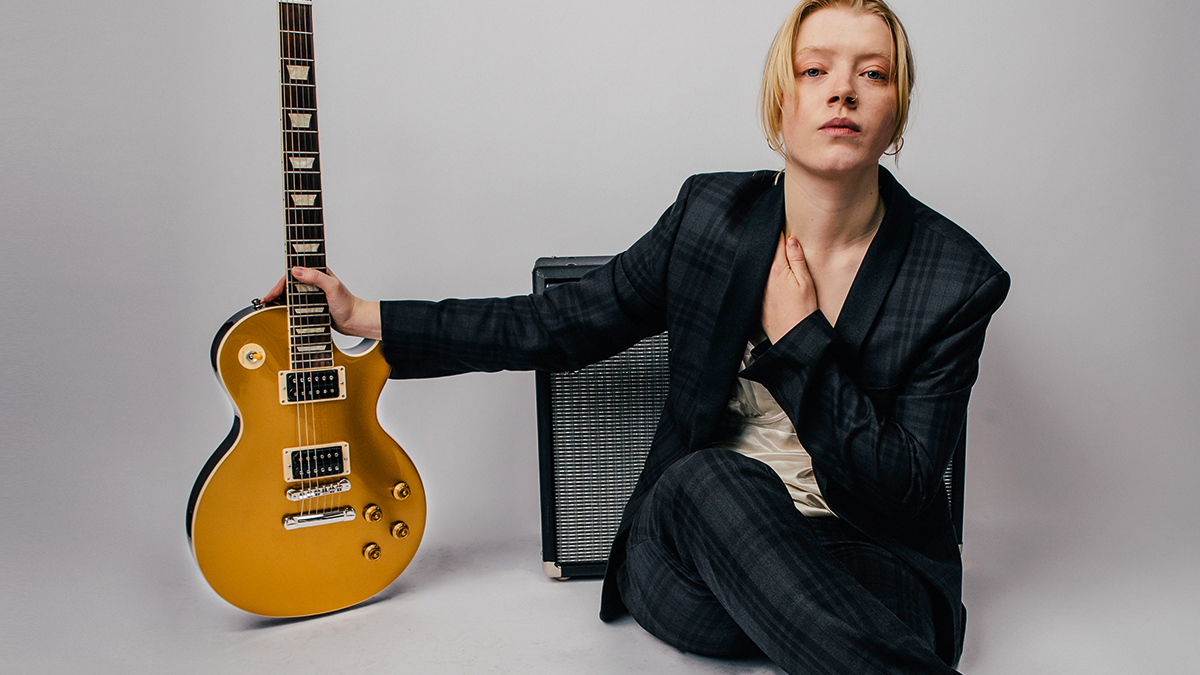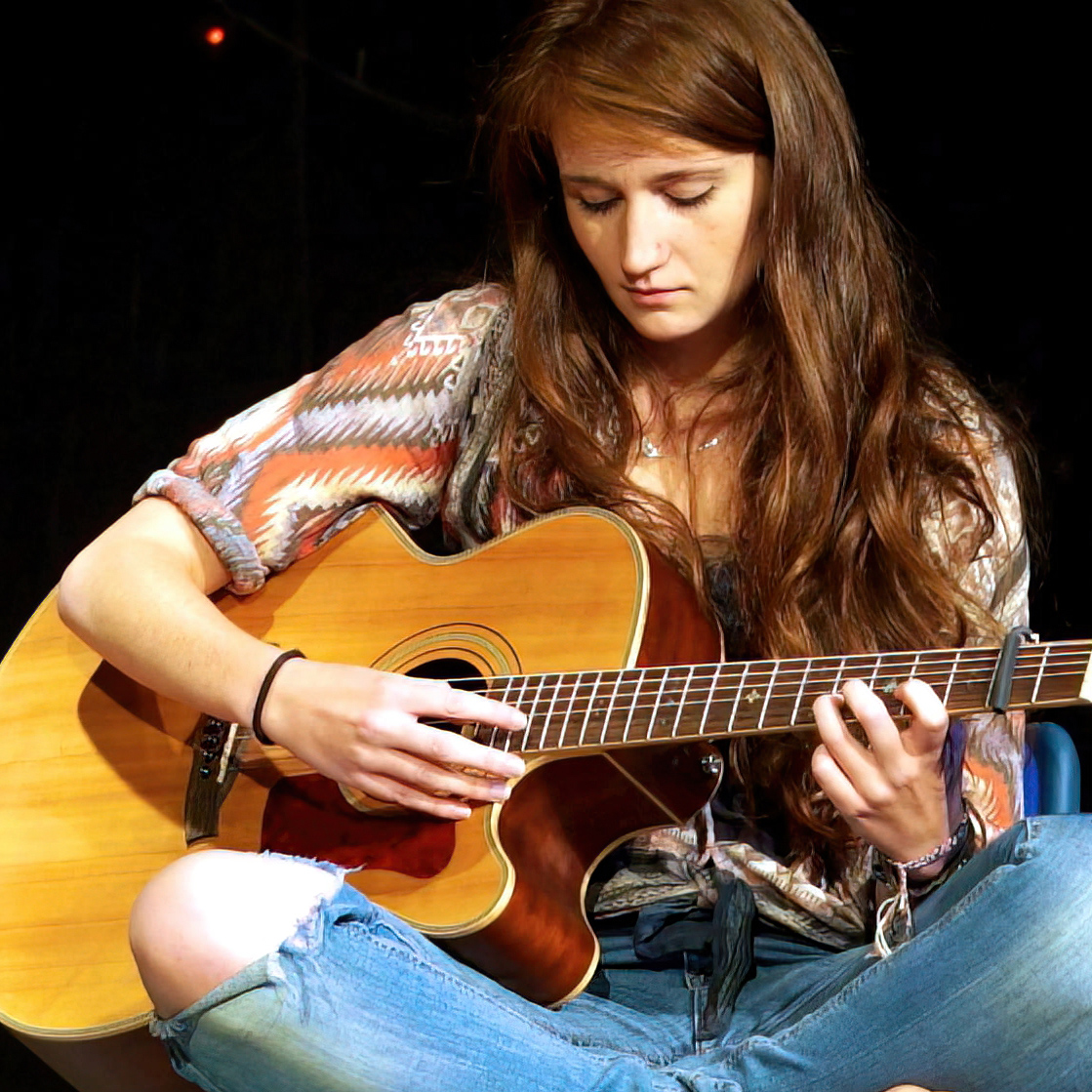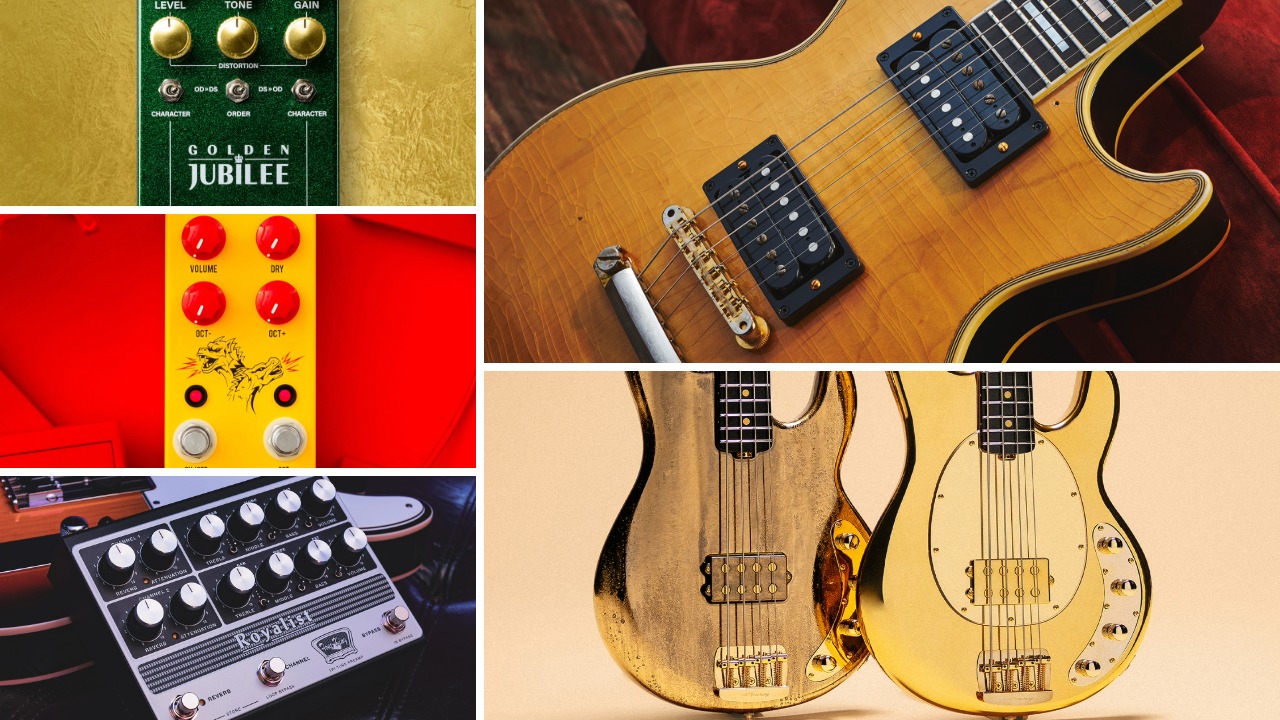“I love Gibson – I always have. Even though people like Slash play Les Pauls, for me they work better in a jazzier sound-world”: Jimmy Page was bowled over by her playing. Now Rosie Frater-Taylor is injecting jazz solos into pop for an all-new sound
Inspired by jazz-go-pop stars like George Benson and Pat Metheny, the Pickup Music tutor and rising star has a unique guitar-meets-vocal vamping style

All the latest guitar news, interviews, lessons, reviews, deals and more, direct to your inbox!
You are now subscribed
Your newsletter sign-up was successful
It’s a bold claim, but one that we’re prepared to make: there is no other guitarist in the UK right now who sounds quite like Rosie Frater-Taylor. Brought up in a musical household, with a jazz drummer for a father and a jazz singer for a mother, the rapidly rising young Londoner specialises in combining accessible songcraft with wicked jazz-infused guitar chops as she deftly blurs the boundaries between rock, alt-pop, neo soul, new-school jazz and folk.
Having first picked up a guitar at a very young age, Rosie possesses an innate kind of connection to her instrument that often manifests itself as a tendency to sing or scat along in unison with the improvised melodies that come flowing out of her fingertips.
A technique originally born out of necessity (she used to need to hum lines aloud in order to find them on the fretboard), it’s developed into a trademark style that never fails to turn heads – even winning her a high-profile fan in the form of Jimmy Page, who once caught a solo performance of Rosie’s at The Troubadour and felt compelled to personally congratulate her on her impressive skills.
“He was just saying all this nice stuff,” she recalls, still in slight disbelief over the encounter, which occurred some years ago now. “It’d be funny to meet him again and actually have a proper conversation about songwriting and guitar playing,” she smiles. “But he’s probably very busy!”
Since that moment, Rosie has amassed well over three million streams on Spotify, further refined her signature guitar-meets-vocal vamping style and even given lessons on the topic for Pickup Music.
“It’s sort of just become a part of my tone and my playing,” she says casually. “People seem to resonate with it. I’m a big George Benson fan. He did it as well and I really like the way it makes your lines sound because it changes your focus – not that I even think consciously about it anymore, to be honest!”
Although she claims not to have perfect pitch, Rosie theorises that – through the sheer number of practice hours she’s put in over the years – she typically just knows how the notes are going to sound before she frets them, and that’s what enables her enviably free-flowing style.
All the latest guitar news, interviews, lessons, reviews, deals and more, direct to your inbox!
“The thing I love to do when I solo is just to take a line and do as much with it as I possibly can, like change the rhythm or slightly vary it in different ways,” she suggests, by way of advice for anyone looking to get their teeth into the slightly intimidating world of jazz improv. “You really don’t need to know a lot of information to play like that. You just need to have a starting point. Playing with other people in that context and putting yourself out of your comfort zone is also important.”
But Rosie isn’t just a gifted improviser, she’s a boundlessly creative and ever-evolving singer-songwriter too. Once a solitary bedroom recording artist, her first two self-produced LPs (2018’s On My Mind and 2021’s Bloom) were soft, woody and primarily cut using acoustic guitars because she reckons it’s “way easier to get a nicer sound from an acoustic instrument than an electric guitar in a bedroom.”
But now, influenced by having spent a good chunk of time touring with her recently formed trio, her astounding new album, Featherweight, takes a more boisterous turn. Packed with full-band studio productions, electric guitars and even a hearty dose of overdrive, it’s a new direction for the jazz wunderkind, and one that she’s absolutely relishing.
“My drummer Tom Potter is an insane drummer and I sort of owe this new-found energy to him,” she says modestly. “The grooviness, the heavier touch and punch definitely stems from playing with him, and we’ve played a few bigger stages at festivals which demanded a certain vigour. So, that was the foundation for the new record.”
But you can’t simply apply a fat rhythm section to any old tunes and expect to be rewarded with a record as compelling or downright unusual as this. No, there’s something special about Rosie Frater-Taylor that makes her a stand-out proposition in the somewhat overcrowded singer-songwriter space.
“I love guitarists that started in the jazz world, but sort of transitioned into the pop world,” she says, citing Benson, Pat Metheny and John Scofield as key influences.
She’s following a similar trajectory, and never flexes her considerable musical education for the sake of it. “I feel like the jazz will always be in my playing, but I almost have a bit of an adverse reaction to it these days,” she laughs, having spent endless childhood hours learning the standards as a member of the National Youth Jazz Orchestra, before going on to study at The Royal Academy of Music.
Nowadays, she takes her cues from other singer-songwriter guitarists who are expanding the rulebook with their own idiosyncratic approaches. Her number one influence is Madison Cunningham, whom she discovered just before starting work on Featherweight, and whom she got the chance to support in the UK back in 2022. It turned out to be one of the most formative experiences of her career to date.
“I saw her every night,” beams Rosie. “I watched every show and it’s a very inspiring thing, watching someone who is better than you and having to rise to that challenge. I’m a big admirer of how she combines the musicality and the songwriting and makes it so accessible and so genre-less.”
Not wanting to “overstep the mark” into overzealous fangirling during the tour, Rosie refrained from approaching Madison for gear or playing advice, but confesses to secretly having had a go on one of the US virtuoso’s acoustics when she wasn’t looking.
“It was the little rubber bridge guitar,” she discloses. “It had flat-wound strings on it, and it was interesting. It sounds great, but that’s kind of her thing and I didn’t want to copy her. That’s the thing about distinctive guitar tones – there’s no point stealing someone else’s!”
Instead, Rosie usually opts for a Gibson Les Paul, which she runs through a Fender Deluxe Reverb for the kind of rounded clean tones heard on album tracks like Falling Fast, Heartbeat or even the surprise cover of TLC’s No Scrubs.
“I love Gibson guitars and I always have,” she enthuses. “I think they’re amazing for the songwriter thing and the jazz thing because they have a very warm sound. Even though people like Slash play Les Pauls, I just find – for me – they work better in a warmer, jazzier sound-world.”
That said, Featherweight also takes several trips into much grittier territories, with stand-out songs Hold The Weight and Give & Take boasting much gnarlier and more angular tones than she typically gets from her trusty LPs.
Any time a track called for a certain sonic shake-up, she would reach for a highly unusual blue Supro Westbury. Fitted with “field-coil” pickups, she first stumbled across the oddball axe while dabbling in a spot of collaborative work with Snarky Puppy’s Michael League.
“He had one because I think Snarky Puppy were endorsed by Supro at one point,” she recalls. “It was the only electric guitar he had at his studio and it’s the craziest sounding guitar you could imagine. It sounds so weird, but it sounds so good! It’s very smooth, but it also has a very plucky sound.
The thing I love about it is that it sounds great with my vibrato, and it sounds great looped and layered. There’s a bunch of layered guitars on Give & Take, and it just fits together really nicely. But it’s a weird guitar and you don’t see anyone with them because, well, Supro’s an amp brand!”
Further describing Give & Take as “the statement track on the record,” and the one that diverges most from her “usual sound,” Rosie also recalls drafting in friend and producer Lewis Moody to help coach her through a mild phobia of dirt in order to achieve bold dynamic shifts she knew the song was crying out for.
“He literally just bent down to my pedalboard and turned the overdrive right up,” she laughs. “It was one of those things where I was quite freaked out to do that because I come from a subtler place, but it was exactly what the track needed. I was frightened to go there, but if you’re going to do it, don’t half do it!”
The Supro Westbury sounds so weird, but it sounds so good! It’s very smooth, but it also has a very plucky sound
Having grown up playing through a very minimal rig that consisted of a guitar, a Henriksen JazzAmp and practically nothing else, Rosie now finds herself emboldened to try out a more daring range of effects, and has recently acquired a Wampler Tumnus Deluxe and a Boss Blues Driver. She’s started toying with phaser pedals and professes to using “a lot of vibrato and reverb” within the trio setting to “pad out the sound and make it feel more full”.
“I’m not an expert at this sound yet,” she confesses. “I think sometimes I go a bit overboard with it and I need to work on making it work in the set.” But the crucial thing is that Rosie has already found her unique guitar ‘voice’ through a lifetime of no frills playing, writing and improvising – and no amount of bells and whistles on top will ever change that.
“I think that’s where everyone needs to start,” she stresses. “Don’t start with the pedals, please!”
- Featherweight is out on February 16 via Cooking Vinyl.
Since graduating university with a degree in English, Ellie has spent the last decade working in a variety of media, marketing and live events roles. As well as being a regular contributor to GuitarWorld.com, she currently heads up the marketing team of a mid-scale venue in the south-west of England. She started dabbling with guitars around the age of seven and has been borderline obsessed ever since. She has a particular fascination with alternate tunings, is forever hunting for the perfect slide for the smaller-handed guitarist, and derives a sadistic pleasure from bothering her drummer mates with a preference for wonky time signatures.






